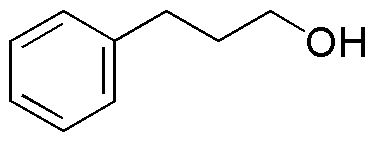3-Phenyl-1-propanol is widely utilized in research focused on:
- Fragrance and Flavor Industry: This compound is often used as a key ingredient in perfumes and flavorings due to its pleasant floral scent, enhancing the sensory experience of various products.
- Pharmaceuticals: It serves as an intermediate in the synthesis of various pharmaceutical compounds, contributing to the development of medications that require specific structural characteristics.
- Polymer Production: 3-Phenyl-1-propanol is utilized in the production of specialty polymers, offering improved properties such as flexibility and durability compared to other similar compounds.
- Research and Development: In academic and industrial labs, it is used in organic synthesis experiments, helping researchers explore new chemical reactions and pathways.
- Cosmetic Formulations: Its emollient properties make it a valuable ingredient in skincare products, providing moisture and improving the texture of creams and lotions.
Informations générales
Propriétés
Sécurité et réglementation
Applications
3-Phenyl-1-propanol is widely utilized in research focused on:
- Fragrance and Flavor Industry: This compound is often used as a key ingredient in perfumes and flavorings due to its pleasant floral scent, enhancing the sensory experience of various products.
- Pharmaceuticals: It serves as an intermediate in the synthesis of various pharmaceutical compounds, contributing to the development of medications that require specific structural characteristics.
- Polymer Production: 3-Phenyl-1-propanol is utilized in the production of specialty polymers, offering improved properties such as flexibility and durability compared to other similar compounds.
- Research and Development: In academic and industrial labs, it is used in organic synthesis experiments, helping researchers explore new chemical reactions and pathways.
- Cosmetic Formulations: Its emollient properties make it a valuable ingredient in skincare products, providing moisture and improving the texture of creams and lotions.
Documents
Fiches de données de sécurité (FDS)
La FDS fournit des informations de sécurité complètes sur la manipulation, le stockage et l’élimination du produit.
Spécifications du produit (PS)
Le PS fournit une description complète des propriétés du produit, notamment sa composition chimique, son état physique, sa pureté et les exigences de stockage. Il détaille également les plages de qualité acceptables et les applications prévues du produit.
Certificats d'analyse (COA)
Recherchez des certificats d'analyse (COA) en saisissant le numéro de lot du produit. Les numéros de lot et de lot se trouvent sur l'étiquette d'un produit, après les mots « Lot » ou « Lot de fabrication ».
Numéro de catalogue
Numéro de lot/série
Certificats d'origine (COO)
Ce certificat d'exploitation confirme le pays dans lequel le produit a été fabriqué, et détaille également les matériaux et composants utilisés et s'il est issu de sources naturelles, synthétiques ou autres sources spécifiques. Ce certificat peut être requis pour les douanes, le commerce et la conformité réglementaire.
Numéro de catalogue
Numéro de lot/série
Fiches de données de sécurité (FDS)
La FDS fournit des informations de sécurité complètes sur la manipulation, le stockage et l’élimination du produit.
DownloadSpécifications du produit (PS)
Le PS fournit une description complète des propriétés du produit, notamment sa composition chimique, son état physique, sa pureté et les exigences de stockage. Il détaille également les plages de qualité acceptables et les applications prévues du produit.
DownloadCertificats d'analyse (COA)
Recherchez des certificats d'analyse (COA) en saisissant le numéro de lot du produit. Les numéros de lot et de lot se trouvent sur l'étiquette d'un produit, après les mots « Lot » ou « Lot de fabrication ».
Numéro de catalogue
Numéro de lot/série
Certificats d'origine (COO)
Ce certificat d'exploitation confirme le pays dans lequel le produit a été fabriqué, et détaille également les matériaux et composants utilisés et s'il est issu de sources naturelles, synthétiques ou autres sources spécifiques. Ce certificat peut être requis pour les douanes, le commerce et la conformité réglementaire.

